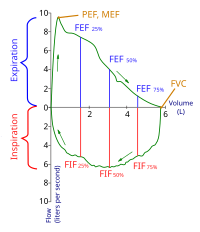
P4129cMR-Pulmonary transit time and pulmonary blood volume have an additional prognostic value over cMR-right ventricular ejection fraction in predicting mortality in HF-rEF patients
Sign Up to like & getrecommendations! Published in 2019 at "European Heart Journal"
DOI: 10.1093/eurheartj/ehz745.0701
Abstract: Assessment of congestion and cardiac function has been shown to have both therapeutic and prognostic implication for the management of patient with CHF. Pulmonary transit time (PTT) assessed by cMR is a novel parameter, which… read more here.
Keywords: pulmonary transit; volume; transit time; cmr ... See more keywords

Pulmonary transit time has close relation with pulmonary pulse wave transit time in normal subjects
Sign Up to like & getrecommendations! Published in 2022 at "Clinical Physiology and Functional Imaging"
DOI: 10.1111/cpf.12794
Abstract: Pulmonary transit time (PTT) and pulmonary pulse wave transit time (pPTT) are useful parameters for the evaluation of cardiopulmonary circulation and vascular alterations, but their relationship remains unknown. The aim of this study was to… read more here.
Keywords: transit; pulmonary pulse; transit time; pulmonary transit ... See more keywords

Noninvasive pulmonary transit time: A new parameter for general cardiac performance
Sign Up to like & getrecommendations! Published in 2017 at "Echocardiography"
DOI: 10.1111/echo.13590
Abstract: Pulmonary transit time (PTT) assessed with contrast‐enhanced ultrasound (CEUS) is a novel tool to evaluate cardiac function. PTT represents the time for a bolus of contrast to pass from the right to the left ventricle,… read more here.
Keywords: cardiac performance; pulmonary transit; time; general cardiac ... See more keywords

Pulmonary transit of contrast during exercise is related to improved cardio-pulmonary performance in highly trained endurance athletes
Sign Up to like & getrecommendations! Published in 2019 at "European Journal of Preventive Cardiology"
DOI: 10.1177/2047487319891779
Abstract: Background The mechanisms underlying the high interindividual variability demonstrated for right-ventricular (RV) adaptation to exercise have not yet been identified, but different pulmonary vascular adaptations among individuals could be involved. Pulmonary transit of agitated saline… read more here.
Keywords: trained endurance; highly trained; pulmonary transit; exercise ... See more keywords